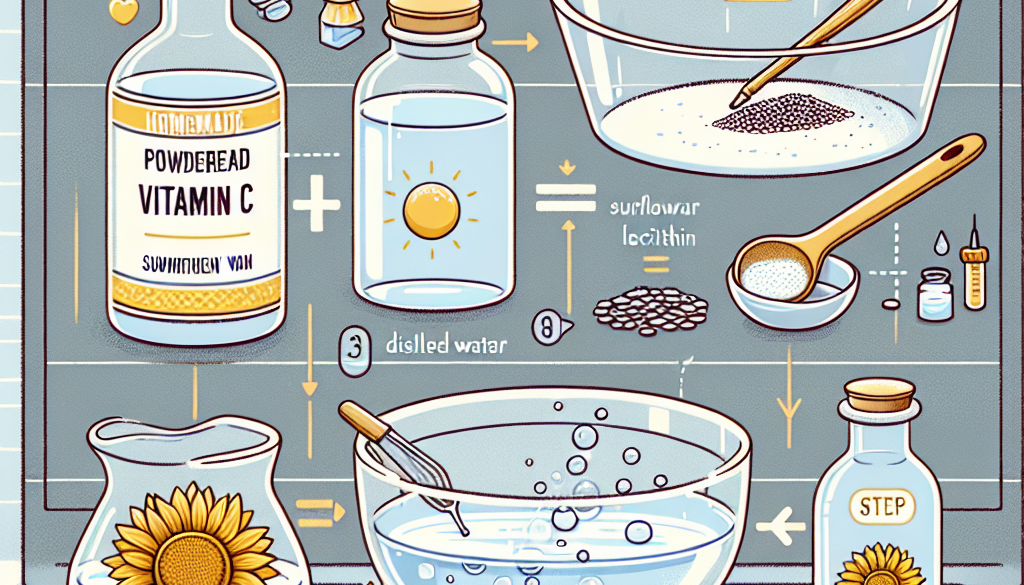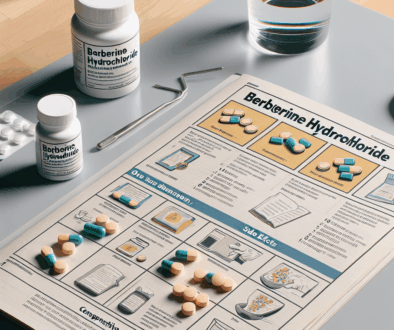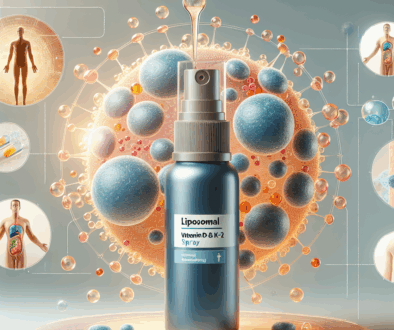Can You Make Your Own Liposomal Vitamin C?
-
Table of Contents
- Can You Make Your Own Liposomal Vitamin C?
- Understanding Liposomal Vitamin C
- The Benefits of Liposomal Vitamin C
- Can You Make Liposomal Vitamin C at Home?
- Ingredients and Equipment Needed
- Step-by-Step Guide to Making Liposomal Vitamin C
- Potential Challenges and Considerations
- Conclusion
- Explore ETprotein’s Protein Products
Can You Make Your Own Liposomal Vitamin C?
Liposomal Vitamin C has gained popularity due to its enhanced absorption capabilities compared to traditional forms of vitamin C. This article explores whether you can make your own liposomal vitamin C at home, the benefits of doing so, and the steps involved in the process.
Understanding Liposomal Vitamin C
Liposomal Vitamin C is a form of vitamin C encapsulated within liposomes. Liposomes are tiny, nano-sized vesicles made out of the same material as a cell membrane. Encapsulating vitamin C in liposomes helps protect the vitamin from degradation in the digestive system and enhances its absorption into the bloodstream.
The Benefits of Liposomal Vitamin C
- Enhanced Absorption: Liposomal technology allows for higher levels of vitamin C to enter the bloodstream, ensuring more of the nutrient is available for use by the body.
- Reduced Gastrointestinal Distress: Traditional forms of vitamin C, such as ascorbic acid, can cause stomach upset or heartburn in some people. Liposomal forms can mitigate these issues.
- Increased Bioavailability: The encapsulation in liposomes protects vitamin C from being broken down in the digestive tract, thereby increasing its bioavailability.
Can You Make Liposomal Vitamin C at Home?
Yes, it is possible to make liposomal vitamin C at home using some basic ingredients and equipment. While the process does not replicate the high-tech methods used in commercial production, homemade liposomal vitamin C can still offer benefits over standard vitamin C supplements.
Ingredients and Equipment Needed
- Vitamin C Powder: Ascorbic acid works best for homemade preparations.
- Lecithin: Sunflower or soy lecithin is used to create the liposomes. Sunflower lecithin is preferred by many due to its non-GMO status.
- Ultrasonic Cleaner: This device, often used to clean jewelry and eyeglasses, is crucial for mixing the ingredients at a microscopic level to form liposomes.
- Distilled Water: Used as the solvent.
- Blender or High-Speed Mixer: For initial mixing of ingredients.
Step-by-Step Guide to Making Liposomal Vitamin C
- Mixing the Ingredients: Dissolve the vitamin C powder in distilled water. In a separate container, mix the lecithin with distilled water until homogeneous.
- Blending: Combine the vitamin C solution with the lecithin mixture in a blender and mix until thoroughly combined.
- Ultrasonic Processing: Pour the mixture into the ultrasonic cleaner and run it for several cycles to ensure the liposomes are formed. This usually takes about 30 minutes.
- Storage: Store the liposomal vitamin C in a refrigerator in a sealed container to maintain its potency. It is typically effective for up to two weeks.
Potential Challenges and Considerations
While making liposomal vitamin C at home is a cost-effective option, there are some challenges and considerations to keep in mind:
- Quality Control: Commercial products are often made under strict quality controls and tested for efficacy. Homemade versions may vary in potency and stability.
- Consistency: Achieving consistent liposome size and concentration can be difficult without professional equipment.
- Safety: Ensure all equipment is clean and that high-quality ingredients are used to avoid contamination.
Conclusion
Making your own liposomal vitamin C is a feasible project that can enhance your intake of this vital nutrient. With basic kitchen tools and some patience, you can create a supplement that rivals many store-bought options in terms of absorption and bioavailability. However, it’s important to be aware of the limitations and variability involved in homemade preparations.
Explore ETprotein’s Protein Products
If you’re interested in high-quality nutritional supplements, consider exploring ETprotein’s range of products. They offer a variety of organic and allergen-free protein powders that can complement your health regimen.
ETprotein is Liposomal vitamin Factory Manufacturer and Supplier in China, Check further information by visiting the Liposomal vitamin Product Page
Liposomal vitamin Product Page
Request Quotation and Samples of Liposomal vitamin from ETprotein
About ETprotein
ETprotein, a reputable protein and elite nutrition ingredients Liposomal vitamin Chinese factory manufacturer and supplier, is renowned for producing, stocking, exporting, and delivering the highest quality organic bulk vegan proteins and elite nutritional ingredients Liposomal vitamin. They include Organic rice protein, clear rice protein, pea protein, clear pea protein, watermelon seed protein, pumpkin seed protein, sunflower seed protein, mung bean protein, peanut protein. Their offerings, characterized by a neutral taste, non-GMO, allergen-free attributes, cater to a diverse range of industries. They serve nutraceutical, pharmaceutical, cosmeceutical, veterinary, as well as food and beverage finished product distributors, traders, and manufacturers across Europe, USA, Canada, Australia, Thailand, Japan, Korea, Brazil, and Chile, among others.
ETprotein specialization includes exporting and delivering tailor-made protein powder and finished nutritional supplements. Their extensive product range covers sectors like Food and Beverage, Sports Nutrition, Weight Management, Dietary Supplements, Health and Wellness Products, and Infant Formula, ensuring comprehensive solutions to meet all your protein needs.
As a trusted company by leading global food and beverage brands and Fortune 500 companies, ETprotein reinforces China’s reputation in the global arena. For more information or to sample their products, please contact them and email sales(at)ETprotein.com today.












